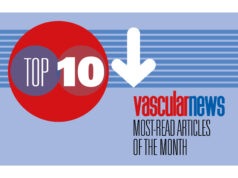 The US Food and Drug Administration (FDA) has approved Valiant Navion thoracic stent graft system (Medtronic) for the minimally invasive repair of all lesions of the descending thoracic aorta, including thoracic aortic aneurysms, blunt thoracic aortic injuries, penetrating atherosclerotic ulcers, intramural haematomas, and aortic type B dissections.
The US Food and Drug Administration (FDA) has approved Valiant Navion thoracic stent graft system (Medtronic) for the minimally invasive repair of all lesions of the descending thoracic aorta, including thoracic aortic aneurysms, blunt thoracic aortic injuries, penetrating atherosclerotic ulcers, intramural haematomas, and aortic type B dissections.
Until now, patients with small iliac arteries were considered ineligible for thoracic endovascular aneurysm repair (TEVAR) or required adjunctive procedures to accommodate calcification and tortuosity concerns. Medtronic states in a press release that Valiant Navion allows for the potential for more patients to receive a percutaneous procedure and overcome these anatomical concerns, enabling a less invasive approach to treatment compared to surgical cut-down (open) procedures.
The Valiant Navion system is a lower-profile evolution of the market-leading Valiant Captivia thoracic stent graft system, which has treated more than 100,000 patients globally. Valiant Navion is built on the design philosophy of the Valiant Captivia system for improved performance and increased patient applicability. The system also features both CoveredSeal (proximal covered) and FreeFlo (proximal bare metal) stent configurations, providing physicians with two graft options to treat varying patient anatomies and pathologies.
“A significant reduction of the delivery system profile enables physicians to better facilitate the endovascular treatment of patients with smaller, tortuous, and calcified access vessel arteries,” says Ali Azizzadeh, the US principal investigator for the Valiant Navion IDE study. “Furthermore, the challenging anatomical and comorbid baseline characteristics and resulting clinical evidence of the global investigational device exemption (IDE) subjects support this design.”
Approval was based on 30-day primary endpoint analysis of 87 patients consecutively enrolled in the international, multicentre, prospective investigational device exemption (IDE) study analysing the safety and efficacy of Valiant Navion in patients with thoracic aortic aneurysms and penetrating atherosclerotic ulcers. The study included a challenging real-world patient population with 37.9% female enrolment and 71.3% patients with severe to life-threatening systemic disease (ASA physical status classification III/IV). The results demonstrated efficacy, with:
- FreeFlo configuration implanted in 74.7% of procedures with no instances of access or deployment failures at implant in the full study cohort.
- The new CoveredSeal proximal configuration implanted in 25.3% of procedures with no instances of access or deployment failures at implant in the full study cohort.
The majority of procedures (50.6%) were performed through a percutaneous access approach, leading to operational efficiency with mean procedure and fluoroscopy times of 88.7±53.4 minutes and 12.2±8.8 minutes, respectively.
Through 30 days, data showed low rates of peri-operative mortality at 2.3% (2/87) and secondary procedures at 2.3% (2/87). The rate of Type Ia endoleaks was 1.2% (1/87) at one-month imaging follow-up.













